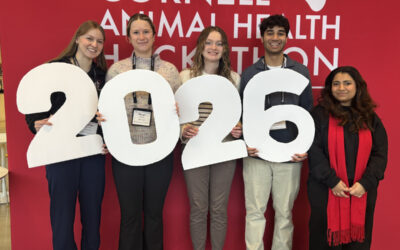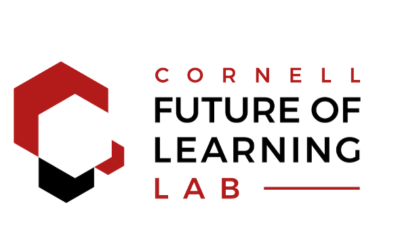Cornell AI News
Want your news listed here? Email us.
Filter by Topic
Hackathon winners combat ear infections, parasites and animal overpopulation
Products to fight ear infections in dogs, a parasite in cattle and animal population control challenges won top honors at the Feb. 20-22 Animal Health Hackathon at the College of Veterinary Medicine.
Cornell Daily Sun: Where Technology Meets Learning: Inside Cornell’s Future of Learning Lab
Founded by Rene Kizilcec roughly seven and a half years ago, the Future of Learning Lab studies the intersection of technology, education and learning science across all age groups, from primary through post-secondary. The lab’s projects span a variety of application areas, from a national database of tutoring interactions to artificial intelligence powered clinical training tools deployed at medical schools across the country to a language-learning platform used in Cornell’s own classrooms.
Ph.D. student Deepak Varuvel Dennison writes about the threat of GenAI to local knowledge in The Guardian
As generative AI becomes a dominant gateway to information, we risk losing something far older and harder to replace: the local knowledge, cultural memory, and lived expertise that never makes it into training data. In a new commentary, Deepak Varuvel Dennison, a Ph.D. student in Information Science in the Cornell Ann S. Bowers College of Computing and Information Science, warns that this shift could trigger a global “knowledge collapse”—and that we’re only beginning to understand what’s slipping away.
AI reveals chemistry behind high-performance battery electrolytes
A new artificial intelligence framework developed at Cornell can accurately predict the performance of battery electrolytes while revealing the chemical principles that govern them, providing engineers with a new tool for designing better batteries.
Weill Cornell Launches AI to Advance Medicine Program
In an effort to unify the rapidly expanding set of academic activities investigating artificial intelligence (AI), Weill Cornell Medicine is launching a new AI to Advance Medicine initiative. Encompassing a Dean’s Lecture Series and Dean’s Grant Program, the...
CALL FOR PROPOSALS: Thought Summits on Data Science and AI
Cornell’s Center for Data Science for Enterprise and Society and Cornell’s Artificial Intelligence Initiative are sponsoring a Call for Proposals for THOUGHT SUMMITS, a Cornell forum aimed at identifying and developing inter- and intra- institutional collaborations in the novel areas of Data Science and Artificial Intelligence.
Cornell Tech Names Chief of Health Innovation, Launches Health Tech Hub Advisory Committee
Cornell Tech has appointed Tanzeem Choudhury as its Chief of Health Innovation and has formed a new Health Tech Hub Advisory Committee composed of leaders from across the healthcare industry.
Choudury has served as the director of the Health Tech Hub at the Jacobs Technion-Cornell Institute for five years. She is also the Roger and Joelle Burnell Professor in Integrated Health and Technology at Cornell Tech, the Cornell Ann S. Bowers College of Computing and Information Science, and the Jacobs Technion-Cornell Institute.
Cornell researchers win prize for insight into conspiracy belief
An article about AI combatting conspiracy theories, co-authored by Cornell psychology researchers Gordon Pennycook and David Rand with a collaborator, has won the 2026 Newcomb Cleveland Prize from the American Association for the Advancement of Science (AAAS). The association’s oldest award, the prize is given to the authors of an outstanding research article published in the journal Science.








